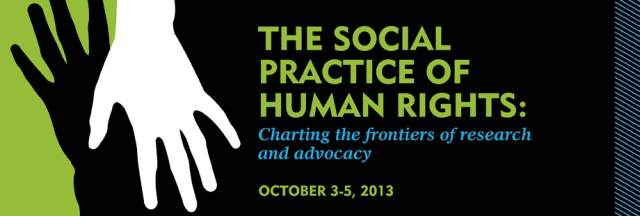Location
River Campus, Room M2265
Start Date
10-4-2013 1:00 PM
Abstract
As a key actor within the human rights transnational advocacy network, NGOs, such as Amnesty International, strive to shape individuals’ values on such contentious issues as the use of torture and to mobilize them to act on their values. While much has been written describing this advocacy work, little systematic research has been done evaluating its efficacy. We conducted archival research to identify the three most common messaging techniques employed by AI: (1) informational frames, where the focus is to educate the reader by presenting them with core facts and statistics; (2) personal frames, where a personal narrative is told with the aim of emotionally impacting the reader; and (3) motivational frames, which emphasize the reader’s agency and include a direct appeal to take action. The efficacy of each framing strategy was tested using an experimental analysis in which participants were randomly assigned to the control group (shown no campaign materials) or one of the treatment groups shown a campaign against torture featuring one of the three framing strategies. Participants were then surveyed regarding their attitudes on the use of torture and their likelihood to get involved in an anti-torture initiative. Results demonstrate that being exposed to an informational or personal narrative campaign increases one’s disapproval of the use of torture. However, none of the campaign strategies were effective at mobilizing individuals to take action. This paper bridges the gap between the advocacy and scholarly communities by empirically examining the messaging techniques commonly employed by human rights NGOs and offering suggestions for more effective campaigns.
Included in
Peace and Conflict Studies Commons, Policy Design, Analysis, and Evaluation Commons, Policy History, Theory, and Methods Commons, Politics and Social Change Commons, Work, Economy and Organizations Commons
Human Rights Organizations as Agents of Change: When Do They Succeed and When Do They Fail?
River Campus, Room M2265
As a key actor within the human rights transnational advocacy network, NGOs, such as Amnesty International, strive to shape individuals’ values on such contentious issues as the use of torture and to mobilize them to act on their values. While much has been written describing this advocacy work, little systematic research has been done evaluating its efficacy. We conducted archival research to identify the three most common messaging techniques employed by AI: (1) informational frames, where the focus is to educate the reader by presenting them with core facts and statistics; (2) personal frames, where a personal narrative is told with the aim of emotionally impacting the reader; and (3) motivational frames, which emphasize the reader’s agency and include a direct appeal to take action. The efficacy of each framing strategy was tested using an experimental analysis in which participants were randomly assigned to the control group (shown no campaign materials) or one of the treatment groups shown a campaign against torture featuring one of the three framing strategies. Participants were then surveyed regarding their attitudes on the use of torture and their likelihood to get involved in an anti-torture initiative. Results demonstrate that being exposed to an informational or personal narrative campaign increases one’s disapproval of the use of torture. However, none of the campaign strategies were effective at mobilizing individuals to take action. This paper bridges the gap between the advocacy and scholarly communities by empirically examining the messaging techniques commonly employed by human rights NGOs and offering suggestions for more effective campaigns.




Comments
This biennial conference provides a unique space for scholars, practitioners and advocates to engage in collaboration, dialogue and critical analysis of human rights advocacy — locally and globally. Learn more about the Human Rights Center at the University of Dayton >>>.